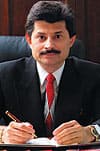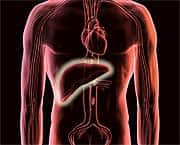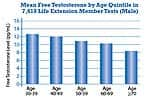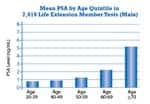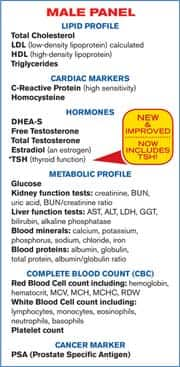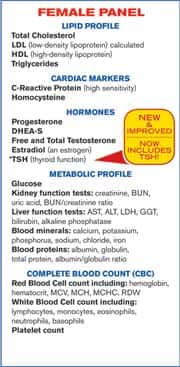Life Extension Magazine®
Aging is accompanied by reduced levels of hormones required to sustain life. As testosterone levels decline in men, their risk of dying markedly increases.1-3 Heart disease,4-8 osteoporosis,9-11 and muscle wasting12-14 are strongly linked to testosterone deficiency, as are chronic inflammatory15,16 and neurodegenerative disorders.17,18 Most doctors are surprised to learn that men with low testosterone show an increased incidence of prostate cancer.19-25 Long before life prematurely ends, testosterone deficit can manifest in the form of psychological disturbances such as depression,26-29 reduced sexual desire,30-33 and a loss of sense of well being.29,34 We at Life Extension® have long urged male members to have their testosterone blood levels tested. A pooled analysis of 7,619 free testosterone blood tests has uncovered an epidemic of testosterone deficits in male Life Extension members. The encouraging news is that restoring testosterone to youthful ranges can easily be accomplished at minimal cost. What you need to knowAn analysis of 7,619 blood test results has uncovered an epidemic of low testosterone in male Life Extension members. Testosterone deficit can manifest in the form of depression, reduced sexual desire and a loss of sense of well-being. Annual blood testing is the single most effective method of detecting deficiencies such as this, so they can be corrected before they lead to serious illness. What are Optimal Free Testosterone Levels?The number of men who suffer testosterone deficiency is so high that laboratory reference ranges accept ridiculously low levels as “normal.”
We at Life Extension suggest that men maintain their free testosterone in the range of 20 to 25 pg/mL of blood.35 Others with expertise in this area believe free testosterone as low as 15 pg/mL is adequate.36 Conventional blood labs, on the other hand, say aging men are alright with as little as 6.6 pg/mL of free testosterone in their blood—an absurdly low level! Mainstream medicine’s ignorance regarding the need to maintain free testosterone in the higher ranges is a significant cause of premature disability and death in aging men. (Note: Free testosterone is the biologically active form of this hormone measured in the blood. Total testosterone blood levels are not as reliable an indicator of an aging man’s testosterone status as free testosterone.) Life Extension Members Not Immune From Testosterone DeficitMost people are in a state of denial as to how long nature intends us to live. A 30 to 40 year old man is often shocked when his blood test results uncover strikingly low free testosterone levels. In our analysis of male members aged 40-49 years, the mean free testosterone blood level was only 12.4 pg/mL. Those aged 30-39 years did not fare that much better, with mean free testosterone levels of only 12.8 pg/mL. Table 1 below shows how much free testosterone levels decrease with age. Men aged 70 and higher have free testosterone blood levels of only 8.9 pg/mL (Table 1).
As I will explain next, even these disappointedly low numbers are still better than the average population. That’s because many Life Extension members take steps to maintain higher free testosterone levels. Shocking Percentages of Testosterone DeficiencyI have reviewed hundreds of testosterone blood tests and consistently observed less than optimal levels. When I saw the mean findings from free testosterone blood tests of Life Extension members, I was not totally surprised. As Table 2 below reveals, only 4.2% of men had high optimal free testosterone blood levels. Another 9.6% of the men were in the mid-range of 15 to 22 pg/mL.
A startling 86% of the men had less than 15 pg/mL of free testosterone, placing them at high risk for virtually every age-related disease. These findings, obtained from pooled blood test results of 7,619 men, provide an intriguing opportunity to rescue the collapsing health system this country faces. If men start paying as much attention to their testosterone blood levels as they do cholesterol, the incidence of degenerative disease will plummet!
How Testosterone Protects Against Heart AttacksMost people know that higher blood levels of HDL protect against atherosclerosis and subsequent heart attack. What few understand is the critical role that testosterone plays in enabling HDL to remove built-up cholesterol away from the arterial wall. HDL removes cholesterol from the arterial wall and returns it to the liver for safe disposal via a process known as reverse cholesterol transport. Testosterone enhances HDL-induced reverse cholesterol transport from the arterial wall.37 That is one of testosterone’s unique and life saving anti-atherosclerotic effects. While a person can reduce their arterial wall exposure to cholesterol through healthier diets and by taking certain drugs, the average person still synthesizes about 650 mg every day of cholesterol in their peripheral tissues (outside of the liver). If there is any distortion in the HDL-mediated removal of cholesterol (i.e. reverse cholesterol transport) from the arterial wall, the consequence is atherosclerosis.38 Said differently, testosterone is required for optimal transport of excess cholesterol from our tissues and blood vessels to our liver for processing and disposal. In the testosterone-deficient state, reverse cholesterol transport is compromised, and excess cholesterol cannot be removed from the arterial wall.39-41
HDL and free testosterone levels often plummet in aging humans.42,43 The combination of low HDL and low testosterone virtually guarantees an explosion in demand for vascular stents and drugs that earn tens of billions of dollars in profits each year for pharmaceutical behemoths. Under optimal circumstances, HDL efficiently removes cholesterol from arterial walls and then transports it (via reverse cholesterol transport) to the liver for elimination (mostly through the bile duct into the intestines). When there is a deficiency of testosterone, HDL is less efficient in removing debris from the arterial wall and the liver is less efficient in breaking down cholesterol-laden HDL from the bloodstream. Armed with this knowledge, you can now see past the charade perpetrated by the medical establishment that still questions the value of testosterone supplementation. Numerous well-controlled human studies show that higher testosterone levels play a critical role in maintaining healthy blood flow throughout the body by accelerating reverse cholesterol transport—there by helping to prevent atherosclerosis.44,45
Low Testosterone Sharply Increases Coronary Artery Disease RiskThe relationship between low testosterone and increased coronary artery disease incidence has been the featured topic of several covers of Life Extension Magazine® over the past two decades. One study evaluated men under age 45 who presented with coronary artery disease compared with an age-matched control group. The findings revealed that even moderately reduced free testosterone blood levels (below 17.3 pg/mL of blood) in these younger men resulted in a 3.3-fold greater risk of developing premature coronary artery disease compared with men who had values above 17.3 pg/mL.46 To put this testosterone blood reading in perspective, aging men who don’t use testosterone-boosting nutrients or drugs often have very low free testosterone blood levels (less than 10 pg/mL of blood). These same men often have low HDL blood test readings in the danger zone (less than 40-50 mg/dL). Is it any wonder that despite aggressive use of statin drugs and other advances in cardiac medicine, heart attack and stroke are still today’s leading killers? Low Testosterone Increases Prostate Cancer RiskFear of prostate cancer is the leading reason why aging men have shied away from restoring their free testosterone to youthful ranges. To dispel this concern, Life Extension long ago analyzed every published study and found there is no basis for asserting that testosterone causes prostate cancer.55-60
Our observations from the thousands of blood tests we perform each year for members confirm this. What we found is that men with low testosterone appear to be more likely to contract prostate cancer. In the landmark book, Testosterone for Life (McGraw-Hill, 2008), Harvard professor Abraham Morgentaler thoroughly discredited the notion that testosterone causes prostate cancer.61 What came as a bombshell to the medical establishment was the compilation by Dr. Morgentaler of scientific facts showing that men with low testosterone levels have an increased percentage of prostate cancer-positive biopsies.62,63 To further help dispel the myth that higher testosterone levels increase PSA levels (and presumably prostate cancer risk), the two charts on the below compiled from our blood test analysis clearly show that as free testosterone levels decline in aging men, their PSA levels sharply increase. What Are Your Free Testosterone Levels?While our data analysis of 7,619 blood tests of male Life Extension members showed less-than-optimal free testosterone levels, there was a considerable amount of individual variability.
Some 60-year old men, for example, had relatively youthful (high) free testosterone levels, while others were dangerously low. An aging male does not have to guess what his free testosterone level is. Blood tests provide an accurate measurement to ascertain if testosterone supplementation is warranted and what dose should be initially used. Blood tests also measure PSA (prostate-specific antigen) to help rule out prostate cancer. While testosterone does not cause prostate cancer, men with pre-existing prostate malignancy are usually advised to avoid supplemental testosterone until the disease is cured. Low-cost and Convenient Blood TestingThe high prices that commercial labs charge for comprehensive blood testing precludes most people from having them done. Life Extension breaks down these price barriers by offering complete Male or Female Blood Test Panels at the lowest prices anywhere. Once a year, we discount the popular Male and Female Blood Test Panels down to only $199—about 80% less than what commercial labs charge. below describes the many tests included in these Male and Female Panels. Instead of having to make a doctor’s appointment, we send you a requisition form and list of drawing stations in your area where you can go at your convenience. You can have your blood drawn any time after receiving your requisition kit. The results of your blood tests are mailed directly to you. If you have any questions, you are welcome to call our health advisor helpline. Annual blood testing is the single most effective method of detecting abnormalities that can be corrected before they lead to serious illness or death. A call to 1-800-208-3444 is all you have to do to order these comprehensive tests at extra discounted prices. For longer life,
William Faloon
|
|||||||||||||||||||||||||||||||||||||||||||||||||||||||||||||||||||||||||||||||||||||||||||||||||||||
| References | |||||||||||||||||||||||||||||||||||||||||||||||||||||||||||||||||||||||||||||||||||||||||||||||||||||
|
1.Shores MM, Matsumoto AM, Sloan KL, Kivlahan DR. Low serum testosterone and mortality in male veterans. Arch Intern Med. 2006 Aug 14;166(15):1660-5. 2.Laughlin GA, Barrett-Connor E, Bergstrom J. Low serum testosterone and mortality in older men. J Clin Endocrinol Metab. 2008 Jan;93(1):68-75. 3.Shores MM, Moceri VM, Gruenwals DA, et al. low testosterone is associated with decreased function and increased mortality risk: a preliminary study of men in a geriatric rehabilitation unit. J Am Geriatr Soc. 2004;52:2077-81. 4.Jankowska EA, Biel B, Majda J, et al. Anabolic deficiency in men with chronic heart failure: prevalence and detrimental impact on survival. Circulation. 2006 Oct 24;114(17):1829-37. 5.Khaw KT, Dowsett M, Folkerd E, et al. Endogenous testosterone and mortality due to all causes, cardiovascular disease, and cancer in men: European prospective investigation into cancer in Norfolk (EPIC-Norfolk) Prospective Population Study. Circulation. 2007 Dec 4;116(23):2694-701. 6.English KM, Mandour O, Steeds RP, Diver MJ, Jones TH, Channer KS. Men with coronary artery disease have lower levels of androgens than men with normal coronary angiograms. Eur Heart J. 2000 Jun;21(11):890-4. 7.Hak AE, Witteman JC, de Jong FH, et al. Low levels of endogenous androgens increase the risk of atherosclerosis in elderly men: the Rotterdam study. J Clin Endocrinol Metab. 2002 Aug;87(8):3632-9. 8.Rosano GM, Leonardo F, Pagnotta P, et al. Acute anti-ischemic effect of testosterone in men with coronary artery disease. Circulation. 1999 Apr 6;99(13):1666-70. 9.Tuck SP, Francis RM. Testosterone, bone and osteoporosis. Front Horm Res. 2009; 37:123-32. 10.Arver S, Lehtihet M. Current guidelines for the diagnosis of testosterone deficiency. Front Horm Res. 2009; 37:5-20. 11.Cawthon PM, Ensrud KE, Laughlin GA, et al. Sex hormones and frailty in older men: the osteoporotic fractures in men (MrOS) study. J Clin Endocrinol Metab. 2009 Oct;94(10):3806-15. 12.Kamel HK, Maas D, Duthie EH, Jr. Role of hormones in the pathogenesis and management of sarcopenia. Drugs Aging. 2002; 19(11):865-77. 13.Marcell TJ, Harman SM, Urban RJ, et al. Comparison of GH, IGF-I, and testosterone with mRNA of receptors and myostatin in skeletal muscle in older men. Am J Physiol Endocrinol Metab. 2001 Dec;281(6):E1159-E64. 14.Bhasin S, Storer TW, Berman N, et al. Testosterone replacement increases fat-free mass and muscle size in hypogonadal men. J Clin Endocrinol Metab. 1997 Feb;82(2):407-13. 15.Tang YJ, Lee WJ, Chen YT, Liu PH, Lee MC, Sheu WH. Serum testosterone level and related metabolic factors in men over 70 years old. J Endocrinol Invest. 2007 Jun;30(6):451-8. 16.Maggio M, Basaria S, Ceda GP, et al. The relationship between testosterone and molecular markers of inflammation in older men. J Endocrinol Invest. 2005; 28(11 Suppl Proceedings):116-9. 17.Gouras GK, Xu H, Gross RS, et al. Testosterone reduces neuronal secretion of Alzheimer’s beta-amyloid peptides. Proc Natl Acad Sci U S A. 2000 Feb 1;97(3):1202-5. 18.Lu PH, Masterman DA, Mulnard R, et al. Effects of testosterone on cognition and mood in male patients with mild Alzheimer disease and healthy elderly men. Arch Neurol. 2006 Feb;63(2):177-85. 19.Rhoden EL, Morgentaler A. Risks of testosterone-replacement therapy and recommendations for monitoring. N Engl J Med. 2004 Jan 29;350(5):482-92. 20.Morgentaler A, Rhoden EL. Prevalence of prostate cancer among hypogonadal men with prostate-specific antigen levels of 4.0 ng/mL or less. Urology. 2006 Dec;68(6):1263-7. 21.Banach-Petrosky W, Jessen WJ, Ouyang X, et al. Prolonged exposure to reduced levels of androgen accelerates prostate cancer progression in Nkx3.1; Pten mutant mice. Cancer Res. 2007 Oct 1;67(19):9089-96. 22.Hoffman MA, DeWolf WC, Morgentaler A. Is low serum free testosterone a marker for high grade prostate cancer? J Urol. 2000 Mar;163(3):824-7. 23.Rhoden EL, Morgentaler A. Testosterone replacement therapy in hypogonadal men at high risk for prostate cancer: results of 1 year of treatment in men with prostatic intraepithelial neoplasia. J Urol. 2003 Dec;170(6 Pt 1):2348-51. 24.Morgentaler A, Bruning CO 3rd, DeWolf WC. Occult prostate cancer in men with low serum testosterone levels. JAMA. 1996 Dec 18;276(23):1904-6. 25.Morgentaler A. Testosterone and prostate cancer: an historical perspective on a modern myth. Eur Urol. 2006 Nov;50(5):935-9. 26.Almeida OP, Yeap BB, Hankey GJ, Jamrozik K, Flicker L. Low free testosterone concentration as a potentially treatable cause of depressive symptoms in older men. Arch Gen Psychiatry. 2008 Mar;65(3):283-9. 27.Pope HG Jr, Cohane GH, Kanayama G, Siegel AJ, Hudson JI. Testosterone gel supplementation for men with refractory depression: a randomized, placebo-controlled trial. Am J Psychiatry. 2003 Jan;160(1):105-11. 28.Seidman SN, Rabkin JG. Testosterone replacement therapy for hypogonadal men with SSRI-refractory depression. J Affect Disord. 1998 Mar;48(2-3):157-61. 29.Barrett-Connor E, Von Mühlen DG, Kritz-Silverstein D. Bioavailable testosterone and depressed mood in older men: the Rancho Bernardo Study. J Clin Endocrinol Metab. 1999 Feb;84(2):573-7. 30.Saad F, Gooren LJ, Haider A, Yassin A. A dose-response study of testosterone on sexual dysfunction and features of the metabolic syndrome using testosterone gel and parenteral testosterone undecanoate. J Androl. 2008 Jan-Feb;29(1):102-5. 31.Wang C, Cunningham G, Dobs A, et al. Long-term testosterone gel AndroGel) treatment maintains beneficial effects on sexual function and mood, lean and fat mass, and bone mineral density in hypogonadal men. J Clin Endocrinol Metab. 2004 May;89(5):2085-98. 32.Arver S, Dobs AS, Meikle AW, Allen RP, Sanders SW, Mazer NA. Improvement of sexual function in testosterone deficient men treated for 1 year with a permeation enhanced testosterone transdermal system. J Urol. 1996 May;155(5):1604-8. 33.Davidson JM, Camargo CA, Smith ER. Effects of androgen on sexual behavior in hypogonadal men. J Clin Endocrinol Metab. 1979 Jun;48(6):955-8. 34.Amore M. Partial androgen deficiency and neuropsychiatric symptoms in aging men. J Endocrinol Invest. 2005;28(11 Suppl Proceedings):49-54. 35.Faloon W. Physician’s guide: Using blood tests to safely induce weight loss. Life Extension Magazine. 2009 Jun;15(6):42-63. 36.Turhan S, Tulunay C, Güleç S, et al. The association between androgen levels and premature coronary artery disease in men. Coron Artery Dis. 2007 May;18(3):159-62. 37.Langer C, Gansz B, Goepfert C, et al. Testosterone up-regulates scavenger receptor BI and stimulates cholesterol efflux from macrophages. Biochem Biophys Res Commun. 2002 Sep 6;296(5):1051-7. 38.Assmann G, Nofer JR. Atheroprotective effects of high-density lipoproteins. Annu Rev Med. 2003;54:321-41. 39.Attia N, Nakbi A, Smaoui M, et al. Increased phospholipid transfer protein activity associated with the impaired cellular cholesterol efflux in type 2 diabetic subjects with coronary artery disease. Tohoku J Exp Med. 2007 Oct;213(2):129-37. 40.Wu FC, von Eckardstein A. Androgens and coronary artery disease. Endocr Rev. 2003 Apr;24(2):183-217. 41.Traish AM, Abdou R, Kypreos KE. Androgen deficiency and atherosclerosis: The lipid link. Vascul Pharmacol. 2009 Nov-Dec;51(5-6):303-13. 42.Yeap BB, Almeida OP, Hyde Z, et al. In men older than 70 years, total testosterone remains stable while free testosterone declines with age. Eur J Endocrinol. 2007 May;156(5):585-94. 43.Cziraky MJ, Watson KE, Talbert RL. Targeting low HDL-cholesterol to decrease residual cardiovascular risk in the managed care setting. J Manag Care Pharm. 2008 Oct;14(8 Suppl):S3-28; quiz S30-1. 44.Eckardstein A, Wu FC. Testosterone and atherosclerosis. Growth Horm IGF Res. 2003 Aug;13 Suppl AS72-S84. 45.Shabsigh R, Katz M, Yan G, Makhsida N. Cardiovascular issues in hypogonadism and testosterone therapy. Am J Cardiol. 2005 Dec 26;96(12B):67M-72M. 46.Turhan S, Tulunay C, Gulec S, et al. The association between androgen levels and premature coronary artery disease in men. Coron Artery Dis. 2007 May;18(3):159-62. 47.Cucuianu M, Coca M, Hancu N. Reverse cholesterol transport and atherosclerosis. A mini review. Rom J Intern Med. 2007; 45(1):17-27. 48.Herbst KL, Amory JK, Brunzell JD, Chansky HA, Bremner WJ. Testosterone administration to men increases hepatic lipase activity and decreases HDL and LDL size in 3 wk. Am J Physiol Endocrinol Metab. 2003 Jun;284(6):E1112-8. 49.Kapoor D, Malkin CJ, Channer KS, Jones TH. Androgens, insulin resistance and vascular disease in men. Clin Endocrinol (Oxf). 2005 Sep;63(3):239-50. 50.Barrett-Connor E, Khaw KT, Yen SS. A prospective study of dehydroepiandrosterone sulfate, mortality, and cardiovascular disease. N Engl J Med. 1986 Dec 11;315(24):1519-24. 51.Moriyama Y, Yasue H, Yoshimura M, et al. The plasma levels of dehydroepiandrosterone sulfate are decreased in patients with chronic heart failure in proportion to the severity. J Clin Endocrinol Metab. 2000 May;85(5):1834-40. 52.Herrington DM. Dehydroepiandrosterone and coronary atherosclerosis. Ann NY Acad Sci. 1995 Dec 29;774:271-80. 53.Feldman HA, Johannes CB, Araujo AB, et al. Low dehydroepiandrosterone and ischemic heart disease in middle-aged men: prospective results from the Massachusetts Male Aging Study. Am J Epidemiol. 2001 Jan 1;153(1):79-89. 54.Thijs L, Fagard R, Forette F, Nawrot T, Staessen JA. Are low dehydroepiandrosterone sulphate levels predictive for cardiovascular diseases? A review of prospective and retrospective studies. Acta Cardiol. 2003 Oct;58(5):403-10. 55.Miner MM, Seftel AD. Testosterone and ageing: what have we learned since the Institute of Medicine report and what lies ahead? Int J Clin Pract. 2007 Apr;61(4):622-32. 56.Tan RS, Salazar JA. Risks of testosterone replacement therapy in ageing men. Expert Opin Drug Saf. 2004 Nov;3(6):599-606. 57.Rhoden EL, Averbeck MA, Teloken PE. Androgen replacement in men under-going treatment for prostate cancer. J Sex Med. 2008 Sep;5(9):2202-8. 58.Morgentaler A. Testosterone replacement therapy and prostate cancer. Urol Clin North Am. 2007 Nov;34(4):555-63. 59.Raynaud JP. Prostate cancer risk in testosterone-treated men. J Steroid Biochem Mol Biol. 2006 Dec;102(1-5):261-6. 60.Gooren L. Androgen deficiency in the aging male: benefits and risks of androgen supplementation. J Steroid Biochem Mol Biol. 2003 Jun;85(2-5):349-55. 61.Morgentaler A. Testosterone for Life. McGraw-Hill; 2008. 62.Schatzl G, Madersbacher S, Thurridl T, et al. High-grade prostate cancer is associated with low serum testosterone levels. Prostate. 2001 Apr;47(1):52-8. 63.Hoffman MA, DeWolf WC, Morgentaler A. Is low serum free testosterone a marker for high grade prostate cancer? J Urol. 2000 Mar;163(3):824-7. |
|||||||||||||||||||||||||||||||||||||||||||||||||||||||||||||||||||||||||||||||||||||||||||||||||||||


